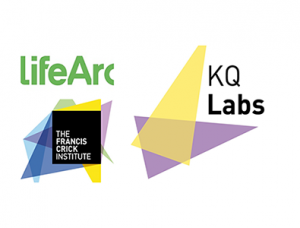KQ Labs, an accelerator programme for start-up companies with high growth potential in the area of data-driven health, run out of the Francis Crick Institute and funded by LifeArc, hosted its Demo Day on 3 March to an invited audience of investors and corporate partners. The event showcased the ten start-ups that are now graduating from the third KQ Labs accelerator programme.

KQ Labs is the only accelerator dedicated entirely to data driven health, with a global focus and providing longer term support, as we aim to catalyse the building of an ecosystem. The programme includes a convertible loan (£40k), workshops with experts tailored to digital health, training in transferable skills, mentoring by a hand-picked network of experts, and introductions to investors and corporates.
The third cohort of the KQ Labs programme culminated in the Demo Day event, where the ten start-ups presented their businesses, illustrating the wide range of areas covered by data driven health activities in the UK. Short descriptions of all the start-ups are given below.
Over the last three years, KQ Labs has now supported 30 start-ups, and while there are some clusters in the areas of drug discovery, imaging and cancer biomarkers / precision medicine, the start-ups’ diversity of areas of activity shows the breadth of potential for impact and benefit for healthcare and patients in the UK. KQ Labs’ wider objective is to catalyse the growth of a data driven health ecosystem for start-ups in the UK, building on the UK’s excellence in both biomedical and data sciences.
This was the first time that the accelerator programme was delivered entirely virtually over the five-month period. The format was very successful, with as high levels of engagement as in the previous in-person setting of workshops at the Crick, and allowed even wider geographic participation, for example enabling a company from Leeds to join, for whom frequent travel otherwise would have been challenging.
KQ Labs will be opening its next cohort for applications in early May 2021, with a view to running the next programme starting at the usual time of late October 2021, with the selection process running during the summer. Data driven health start-ups are encouraged to express interest early by registering on the website and the KQ Labs team are available to discuss the programme content and applicant eligibility. Please see crick.co.uk
Shivani Lamba, CEO of Brightlobe, one of the participating companies said: “KQ Labs was a remarkably supportive training ground for our next steps as a healthcare startup. Our mentors fostered a collegial atmosphere where knowledge-sharing and collaboration with other startups was encouraged, and the quality of speakers and workshops was hugely impressive. We’ve certainly made strides forward since starting our journey at KQ Labs.”
Lucy Jung, CEO of Charco Neurotech and participant in the third cohort of KQ Labs, also commented on her experiences being part of the programme: “It has been an incredibly exciting journey to be part of the KQ Labs accelerator programme – meeting other healthtech founders, sharing our experiences, and learning from experts from diverse industries – all the experiences we had were invaluable for an early stage healthtech startup. The KQlabs team was always incredibly supportive and organised – despite all the events being virtual! It was a safe place for us to ask questions and discuss challenges we faced, which the KQ Labs team picked up quickly and helped us to overcome by providing the necessary connections or advice to get us through.”
Barbara Domayne-Hayman, Entrepreneur-in-Residence at the Francis Crick Institute who leads the KQ Labs said: “We are very proud of our third cohort who have just graduated from the programme, it has been a pleasure to work with them. They, together with the companies in our two previous cohorts, demonstrate the great strength of the UK in this emerging area of data driven health.”
Clare Terlouw, Head of LifeArc Ventures said: “LifeArc plays a vital role in advancing medical research by providing the funds, advice and scientific expertise to translate early stage innovation. We are very pleased to be part of helping to advance new technologies in data-driven health and to see these innovative companies grow.”
Companies participating in KQ Labs Cohort #3 were:
- AI VIVO uniquely combines systems biology and machine learning/AI to build a disruptive platform technology to accelerate drug discovery. The platform fundamentally changes how we represent diseases and the effect of treatments phenotypically and enables us to predict multiple unexpected disease modulation strategies & experimentally validate them significantly faster, cheaper & more accurately.
- Benetalk has developed a digital speech therapist that monitors speaking patterns and provides immediate feedback to help people who stutter to master fluency speaking habits during daily activities.
- Brightlobe develops cutting-edge technology that can intelligently assess and support a child’s developmental trajectory through mobile games and smart toys.
- Charco Neurotech have developed CUE1, a non-invasive wearable device for Parkinson’s, utilising pulsed cueing and focused vibrotactile stimulation to reduce symptoms of slowness and stiffness resulting in improved movement. They are using data-driven insights and machine learning algorithms to track symptom progression and help people with Parkinson’s manage their day-to-day life.
- GLAMOROUS AI has a novel approach to chemical design and optimisation. Its proprietary platform, Rosalind, augments advanced ML with human expertise to enable applications where only limited data points are available.
- Itecho Health provides digital health applications and services for the monitoring and management of long-term (chronic) conditions.
- Mpixl combines deep learning and MRI radiology for faster and kinder care of leukaemia patients.
- Little Journey use technology, research and data to transform healthcare & research outcomes through an end to end psychological preparation and support tool for children and their families.
- Oxford Cancer Analytics aims to revolutionise early cancer detection and treatment through affordable blood tests using automated machine learning platforms for data analysis, biomarker discovery and patient stratification.
- Syrona is a personalised digital women’s health screening and digital therapeutics platform, with a first focus on endometriosis.


